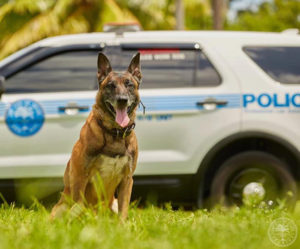 ∙ SPAN Thrift Store is now open to the public and in dire need of volunteers to operate day to day. If you are interested or have questions, please call (805) 641-1170 to inquire.
∙ SPAN Thrift Store is now open to the public and in dire need of volunteers to operate day to day. If you are interested or have questions, please call (805) 641-1170 to inquire.
In addition to that, SPAN is back and providing $10 spays and neuters for low income households with cats and dogs.
The next one is Friday, June 26th at Shiells Park, in the parking lot, located at 649 C St., Fillmore, 93015.
Please call to schedule an appointment
(805) 584-3823.

∙ K-9 Boss, is a Belgium Malinois who has worked for the City of Miami Police Department for seven years. His K-9 unit recently received a grant to assist with his medical expenses. The collaborative grant is from the local National Police Dog Foundation and the Search Dog Foundation who administers funds provided by the Petco Foundation for the treatment of cancer in K-9s.
K-9 Boss is charged with responding to situations that necessitate the specialized skills of the canine teams. As a dual-purpose canine, these situations include interior and exterior searches, evidence searches, and narcotic detection. Boss participates weekly in-service training and must pass annual proficiency evaluations.
Boss participated in the United States Police Canine Association (USPCA) National Trials. He placed 2nd in obedience, 2nd in team trials, and was placed 11th overall dog in the nation.
Boss was found to have a cancerous growth in his spleen. His one-month recovery from the spleen removal was followed by three weeks limited duty. He also received time off for bloat surgery.
Despite all of the spleen’s functions, dogs can live normally without their spleen. Most dogs never have a problem.
“K-9 Boss is definitely a fighter. Even the doctors are amazed on how well he’s recovered from his surgeries. He’s eager to work and still gives Sgt. Perez a good pull when he’s out training. K-9 Boss is here with us to thanks to the amazing service and care provided by Knowles Animal Clinics, says Lieutenant Maurice Sodre, City of Miami Police Department SWAT/Canine K-9 unit.
∙Animal rights groups choose Coronavirus over your safety
By Matthew R. Bailey
Fortunately, the world’s top medical researchers are working on a vaccine for the coronavirus, or COVID-19. That vaccine is poised to be the product of animal research. It’s a case study in how crucial animal research is to improving public health.
Two researchers at the University of Wisconsin-Madison just announced that they’ll “test medical countermeasures such as vaccines and therapeutics” in nonhuman primates. They hope to discover how much of the coronavirus enters the body, where it infects the lungs, and how immune systems respond to it.
Scientists at New York-based biotechnology company Regeneron are working with mice to see how they respond after being infected with the coronavirus. Researchers have modified the mice’s genetic code to mimic a human’s immune system. They hope to use antibodies the mice generate following infection to develop an effective treatment.
Meanwhile, the National Institutes of Health is investigating whether an existing antiviral drug, “remdesivir” might work against COVID-19. Originally developed using rhesus macaques, remdesivir is effective against Nipah virus, Ebola, and “MERS,” another coronavirus strain that has killed over 800 people since first emerging in 2012.
The initial results have been promising. A 35-year-old American coronavirus patient recently used Washington’s “compassionate use” laws, which allow critically ill patients to access unlicensed drugs, to gain access to remdesivir. He quickly recovered, but it’s too early to definitively attribute his recovery to the drug.
Researchers working on vaccines or treatments for threats like COVID-19 depend on animal models because they provide the closest approximation of how a potential therapy will operate in the human body.
The interaction between a promising vaccine or treatment and a living organism is too complex to replicate in a petri dish or computer simulation. For this work, there’s simply no substitute for a live animal model.
That’s why animal research is the basis for so many medical advances, including vaccines for measles and polio as well as life-saving diabetes drugs.
Consider the progress against HIV/AIDS. A few decades ago, the virus killed more people between the ages of 25 and 44 than any other disease in a number of communities nationwide. An HIV diagnosis was effectively a death sentence.
No more. Powerful drug cocktails have rendered HIV/AIDS a manageable disease. Those medicines were developed using macaque monkeys and “humanized mice” genetically modified to have compromised immune systems that more closely approximate human patients with HIV. Animal research yielded AZT, the breakthrough HIV/AIDS drug cocktail approved by the FDA in 1987.
Despite the medical progress animal research has enabled, some activists are trying to restrict its use by arguing that it’s inhumane. But animal research is tightly regulated by the federal government. Just like in hospitals, researchers are required to use appropriate anesthetic and analgesic drugs to ensure animals don’t experience pain. Those responsible for overseeing research must certify that use of animals is necessary. Even then, scientists are required to use as few as possible.
Yet according to a Pew survey, slightly less than half of Americans — 46 percent — favor animal research. Once animal research yields a treatment for the coronavirus, perhaps the remainder will change their minds.
Matthew R. Bailey is president of the Foundation for Biomedical Research. This piece originally ran in the Detroit News.
